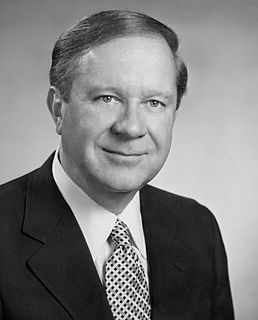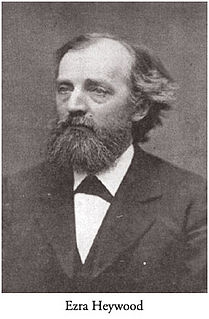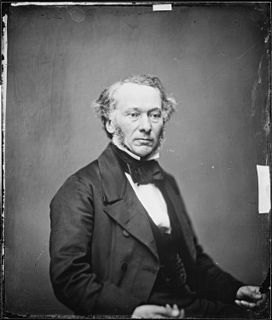A Quote by Benjamin Tucker
It is not competition, but monopoly, that deprives labor of its product. Destroy the banking monopoly, establish freedom in finance, and down will go interest on money through the beneficent influence of competition. Capital will be set free, business will flourish, new enterprises will start, labor will be in demand, and gradually the wages of labor will rise to a level with its product.
Related Quotes
Bring on those tired, labor-plagued, competition-weary companies and ESOP will breathe new life into them. They will find ESOP better than Geritol. It will revitalize what is wrong with capitalism. It will increase productivity. It will improve labor relations. It will promote economic justice. It will save the economic system. It will make our form of government and our concept of freedom prevail over those who don't agree with us.
U.S. labor leaders will realize that automation can multiply man's wealth far more rapidly than it is multiplying at present and that automation will leave all men free to search and research... Realizing the direct competition with foreign industry on a straight labor basis will mean swiftly decreasing wages per hour and longer hours and decreasing buying power of the public.
The free-trade idea, logically applied, will abolish usury; and with usury will disappear the chief bone of contention between labor and capital. But, just at this point, free-traders go over to the enemy; and many writers on political economy, in flat contradiction of the essential principles of that science, have made elaborate arguments to prove self-government in finance, impossible! What shall we think of men who, having dethroned kings, demolished popes, destroyed slave oligarchies and assailed tariff monopoly, advise submission to the most oppressive and dishonest of despotisms, Usury?
Since it is to the advantage of the wage-payer to pay as little as possible, even well-paid labor will have no more than what is regarded in a particular society as the reasonable level of subsistence. The lower ranks of labor will commonly have less, and if public relief were afforded even up to the wage-level of the lowest ranks of labor, that relief would compete in the labor market; check or dry up the supply of wage-labor. It would tend to render the performance of work by the wage-earner redundant.
In vast stretches of the earth, men awoke today in hunger. They will spend the day in unceasing toil. And as the sun goes down they will still know hunger. They will see suffering in the eyes of their children. Many despair that their labor will ever decently shelter their families or protect them against disease. So long as this is so, peace and freedom will be in danger throughout our world. For wherever free men lose hope of progress, liberty will be weakened and the seeds of conflict will be sown.
How do I change? If I feel depressed I will sing. If I feel sad I will laugh. If I feel ill I will double my labor. If I feel fear I will plunge ahead. If I feel inferior I will wear new garments. If I feel uncertain I will raise my voice. If I feel poverty I will think of wealth to come. If I feel incompetent I will think of past success. If I feel insignificant I will remember my goals. Today I will be the master of my emotions.
In the form of security and sufficiency for the men who labor to the profit of others, and in the form of registering and controlling them in the form of an organized public supervision of their labor, slavery is already afoot. When slavery shall succeed it will succeed through the acquiescence of those who will be enslaved, for they will prefer sufficiency and security with enslavement, to freedom, responsibility, insecurity and the threat of insufficiency.
The business plan should address: "How will I get customers? How will I market the product or service? Who will I target?" The principles of a business plan are pretty much the same. But after page one to two, everything is unpredictable, because costs or competition will change and you don't know how things will be received by the market. You have to be able to continually adapt. Companies that fail to adapt will die. Others are brilliant at adapting.
We learned long ago that liberty could be preserved only by limiting in some way the freedom of action of individuals; that otherwise liberty would necessarily yield to absolutism; and in the same way we have learned that unless there be regulation of competition, its excesses will lead to the destruction of competition, and monopoly will take its place.
It was the Faith which gradually and indirectly transformed the slave into the serf, and the serf into the free peasant... You will not be able to set up in a pagan or an heretical or a wholly indifferent society the institutions characteristic of economic freedom; you will not be able to curb competition which alone would be sufficient to destroy such freedom, nor pursue permanently and consecutively any one part of the program. The thing must be done as a whole, and it can be done as a whole only by the ambient influence of Catholicism.
If a company is not a monopoly, then the law assumes market competition can restrain the company's actions. No problem. If a monopoly exists, but the monopoly does not engage in acts designed to destroy competition, then we can assume that it earned and is keeping its monopoly the pro-consumer way: by out-innovating its competitors.
Luck is always waiting for something to turn up. Labor, with keen eyes and strong will, always turns up something. Luck lies in bed and wishes the postman will bring news of a legacy. Labor turns out at six o'clock and with busy pen or ringing hammer, lays the foundation of a competence. Luck whines. Labor whistles. Luck relies on chance, labor on character.




































